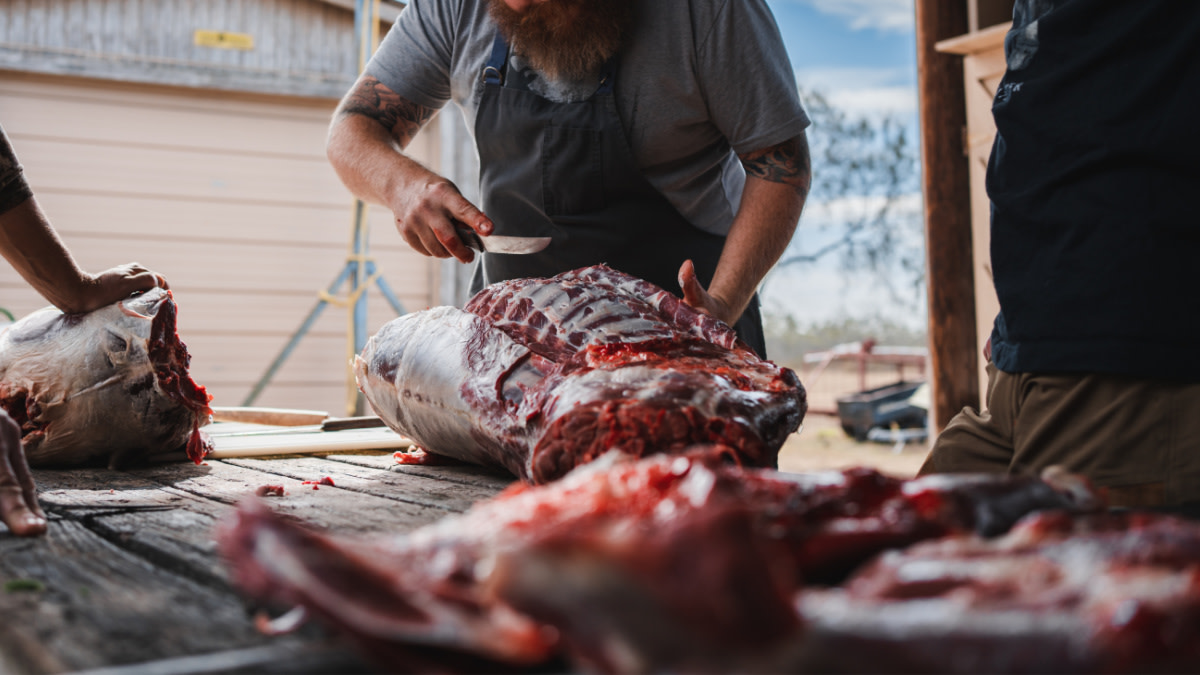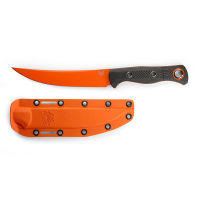
From soaking venison in diet soda to letting birds hang until their heads separate from their bodies, there’s a lot of bad advice floating around when it comes to cooking wild game. Do a quick search for “best way to cook (insert wild game)” and you’re less than five clicks away from instructions to soak the meat in vinegar or the cliché “throw it away and eat the cedar plank” joke.
Luckily, the amount of helpful, thoughtful, and tasty information is on the rise. Wild game is experiencing a renaissance, now celebrated like the premium protein it is instead of an inferior product. While this is encouraging, it’s still worth noting that plenty of questionable, unsavory, and downright dangerous advice is still traded among hunters and anglers. So, I asked some experienced outdoors people and cooks about the worst wild game cooking advice they’ve ever received and compiled it here so you can avoid these pitfalls.
Most of the egregious advice seems to occur in one of two times: the moments right after the kill and the stage of preparation where folks get the idea to soak the meat in some bullshit (figuratively).
Ruining Meat After the Kill “Snapping turtles are a bastard to skin,” Steven Rinella said. “Some guy back home once told me that you can scald them in hot water like you would if you were plucking a chicken. He said the skin will slip right off like a banana peel.”
Steve learned a common cause of ill-informed game-handling advice that day. Most long running advice comes from a place of reason—if a method works with one thing, why wouldn’t it work with something else?
“What happened, instead, is that the skin turned about as tough as the rubber on your truck tires and it welded itself to the meat even more ferociously than normal,” Steve said. “Worse than that was the strange smell of that partially boiled turtle skin. I'll never forget what a mess that was.”
Scalding birds and pigs to remove feathers and hair is common practice because it works. The problem is, you aren’t removing feathers or hair from a snapping turtle. The boiling water causes the skin to contract, making your job even harder.
Mike Silver of Silver Ridge Farm has processed thousands of deer at his custom butchering facility. “Many hunters take great care of their harvest to ensure it is in the best possible condition when it reaches the processor," he said. "Others have never been educated correctly, are flat out lazy, or are faced with time restraints that do not allow for proper harvest and care. Some folks are just doing it how their family taught them. I always say ‘trash in, trash out.’ The manner in which a hunter treats their deer after harvest will directly impact the quality of processed meat we give back to them.”
Silver has heard plenty of hunters claim they got the meat cooled down right away, but then found something very different. “People have brought us a lot of rotting venison over the years,” Silver continued. “They stuff 80 pounds of hot venison in a cooler over a bag of ice and are surprised that it spoiled over the weekend.”
Just like your dishwasher, your cooler isn’t a magic box. It’ll keep cold things cool, but it doesn't instantly make hot things cold, especially when there's a lot of hot stuff. Tightly packing warm meat increases thermal mass and doesn’t allow for efficient transfer of thermal energy—the meat will hold its heat and spoil. If you need things cooled down, spread it out in the shade, get some airflow between big pieces, and increase surface area by deboning or butterflying if needed. Just don't listen when someone says to simply throw it in a cooler on ice.
Some other advice is so extreme that it makes you wonder if the person is trying to help or mess with your head. Chef Jesse Griffiths might just take the cake for receiving the absolute worst, or at least the strangest advice.
“I once had a conversation with a client from Mexico that told me that his ranch manager insisted that large boars be brought back quickly (within 20 minutes) in order for them to be processed in a manner that would render them edible. His technique—and I'm going to put this as delicately as possible—was to manually stimulate the sex organ of the dead hog to post-mortem completion, thus relaxing the carcass. I'm not making this up,” Jesse said. “Obviously, the issue here isn't with palatability, but rather with the ranch manager.”
This kind of advice is the type that gets spread purely because it’s so outrageous. We can only hope that this “advice” was just a gross, shocking, and untried story designed to shock listeners and get the ranch manager out of processing boars. We can only hope.
Soaking Meat in Some Bullshit This is one of the first bits of wild game cooking advice I ever received: “What you need to do is go down to Costco, find the big can of fruit cocktail, the real big one, get two. Then you breast out the geese and you soak the breasts in the fruit cocktail for a week or two, then you grill them. Best way to cook geese there is.”
I was new to hunting but no stranger to cooking, and this advice struck me as both strange and oddly specific. There are plenty of legitimate benefits to brining meats, but using fruit-flavored sugar water is not accomplishing anything other than making meat taste like corn syrup. If you want meat to taste like canned fruit cocktail, maybe you should just eat fruit cocktail and leave the animals alone.
The same thing goes for the common practice of soaking meat in milk.
“I hear it over and over again,” Danielle Prewett said. “‘Soak it in milk to hide gamey flavors.’ This statement is just loaded with issues. The biggest being that meat should taste flavorful but never gamey or off-putting. If it does, something went wrong in the field.”
While there is a time and place for cooking with milk or buttermilk, there’s no reason for it to be a standard procedure everytime you cook game meat.
“If you're cooking a recipe that requires milk because it provides a desired added flavor, like milk-braised turkey or buttermilk fried rabbit, then it's great,” Danielle said. “However, not every recipe should have milk flavored meat, not to mention it turns red meat a terrible gray color. I would never advise anyone to soak a venison steak or duck breast in milk or buttermilk.”
Taking the pH down a few notches, Jenny Wheatley of Food for Hunters, fell victim to some bad advice when she was new to cooking wild game.
“I did a Google search and found a recipe for rabbit pot pie. The instructions said to boil the rabbit in vinegar first to get rid of any gaminess, and being inexperienced, I didn't question it,” Jenny said. “When you're a kid who lives in the city and you keep hearing that wild game is ‘gamey,’ it's natural to think, ‘Oh, ok. That makes sense.’"
She quickly realized she placed her trust in the wrong internet resource: “Halfway through cooking, as the house began to fill with the acrid smell of white vinegar, I had a sinking feeling that our rabbit recipe wasn't going to turn out well,” Jenny said. “And surely, it did not. The rabbit tasted as bad as it smelled, and no amount of rinsing got rid of the strong vinegar flavor. The entire dish was inedible and I felt terrible about having wasted a perfectly good animal.”
Liquids like vinegar and alcohol are generally regarded in the culinary world for their cleaning and preservation applications. Of course, after reading this article, you might also need to pour yourself a glass.
“The smell of cheap booze almost knocked me down,” Silver said, recounting some venison a hunter dropped off for processing. “I called the customer to let him know that I couldn't keep his meat because it was stinking up my walk-in cooler with the smell of cheap liquor. He drunkenly and indignantly told me it wasn't liquor, it was moonshine.”
While sugary syrup and milk can mask the flavor of meat, vinegar and alcohol actually denature the protein and change it on a molecular level. Essentially, you’re pickling the meat when you soak it in a highly acidic or alcohol liquid. You’ll end up with something kind of like ceviche, but gross instead of delicious.
If you think vinegar, corn syrup, milk, or moonshine are bad brines, Jesse Griffiths, as usual, has got it topped.
“I'd easily say that the worst advice I've heard was to soak feral hogs in bleach water. While I'm even opposed to soaking them in ice water, without bleach, this one bordered on dangerous," Jesse said. "This also really illuminates the emotional response that people have when dealing with game, especially an animal that is perceived as 'dirty' like the wild hog. Using water to 'clean' them is an intuitive, though incorrect way, to achieve a sanitary standard. But the addition of bleach is almost comical.”
Almost comical, and depending on the dose, potentially hazardous.
Keep It Wild There seems to be a mysticism around wild game where cooks will try just about anything to cleanse wild game of its wildness. For some reason, some people have the idea that wild game is “dirty” and that needs to be fixed before you can eat it. I’d wager that the same person who soaks their venison backstrap in vinegar wouldn’t treat a store-bought steak the same way.
“There’s this idea that there are certain animals that are impossible to cook,” Jonathan Wilkins of Black Duck Revival said. “Pretty much everything I’ve been told is inedible has just been processed or prepared poorly. Raccoons, carp, gar, snow geese, rutting bucks, bears, beavers, diver ducks, snakes, or boar hogs, I’ve cooked and eaten all of them. While I have my preferences, I’ve been able to make top notch meals out of all those animals."
Jonathan said there are some easy, universal rules everyone should follow: "Fast processing to avoid spoilage, clean knives, keeping meat dry and then intentional preparation in the kitchen make all the difference.”
If you’re gathered 'round a fire pit trading your best recipes or searching the world wide web for how to cook your first squirrel, you’re bound to run into some questionable tactics. You might see some excellent new cooking techniques, but you can also learn some really awful ways to treat game meat that you’ve worked so hard to procure.
“It seems like half the time that someone tells you a weird wild game trick, it ends up working beautifully and changing how you do things. The other half of the time, you end up with some kind of smelly or inedible mess,” Steve Rinella concluded.
All this being said, the absolute worst thing you can do with your game meat is not eat it. It’s a waste of a resource and makes the rest of us hunters look bad. So, do whatever you think you need to make the meat palatable, but leave the toxic cleaning products out of your food.







